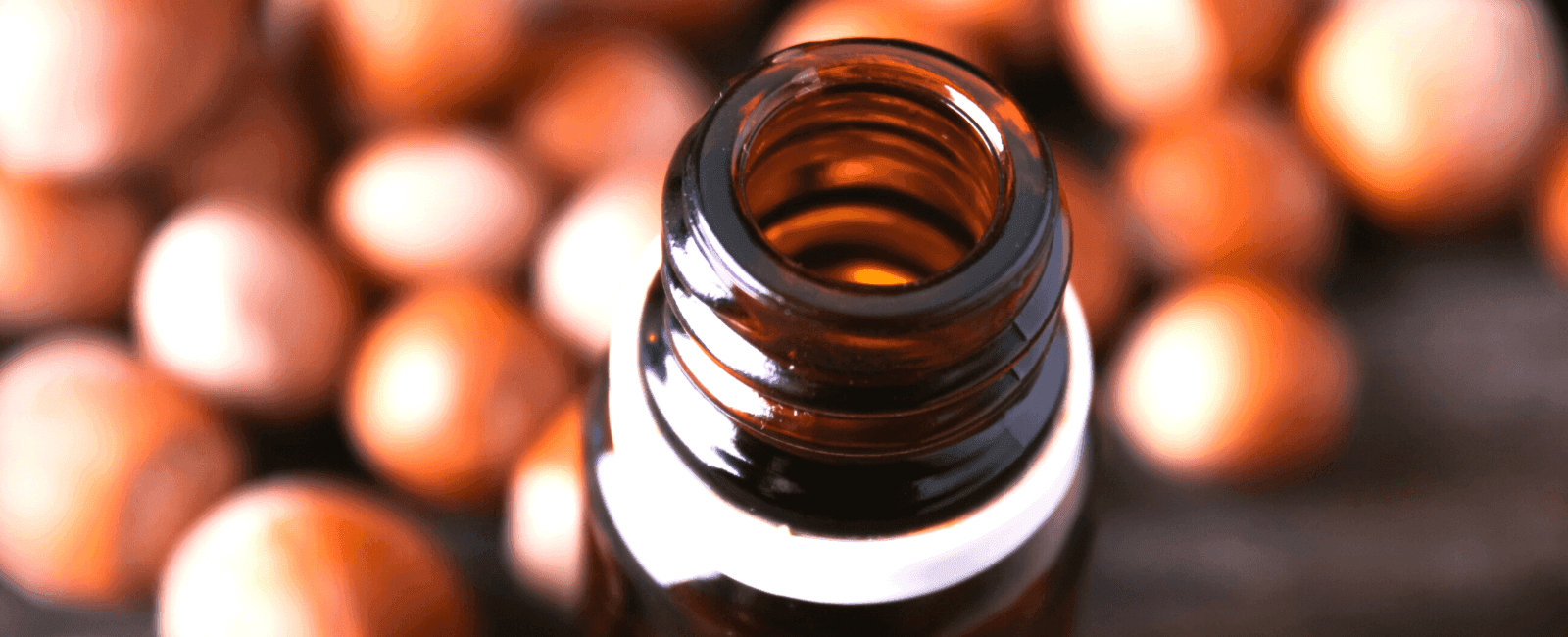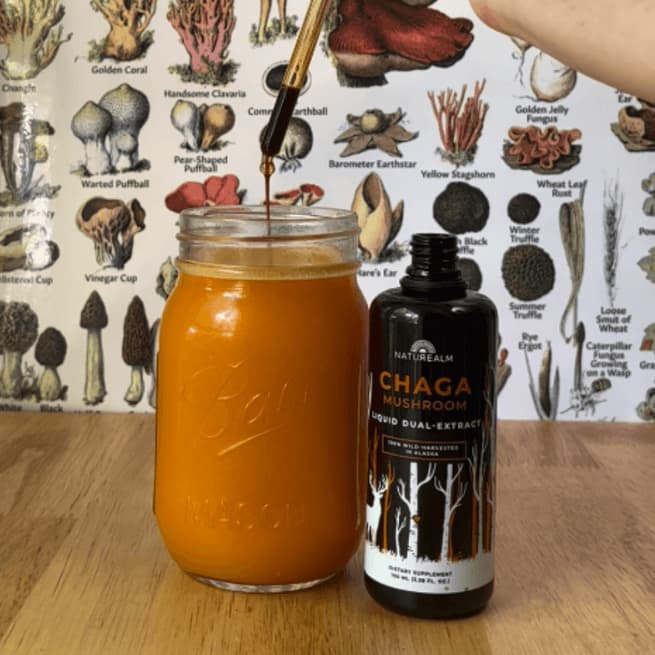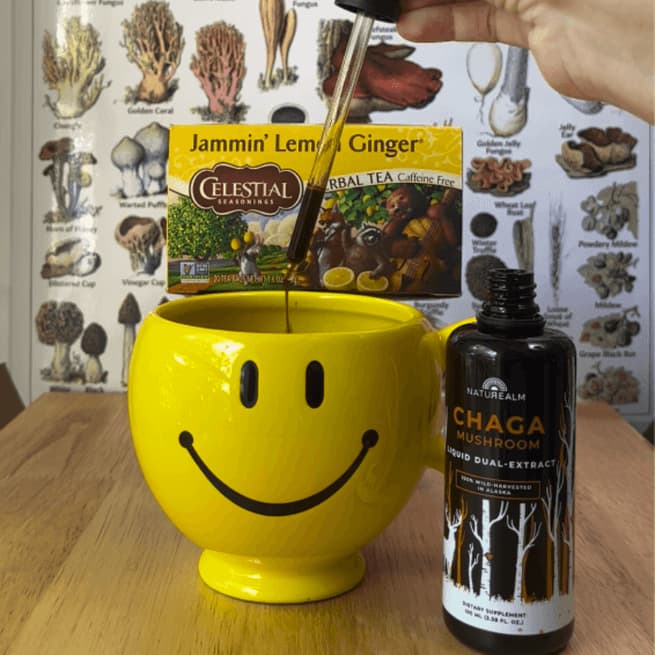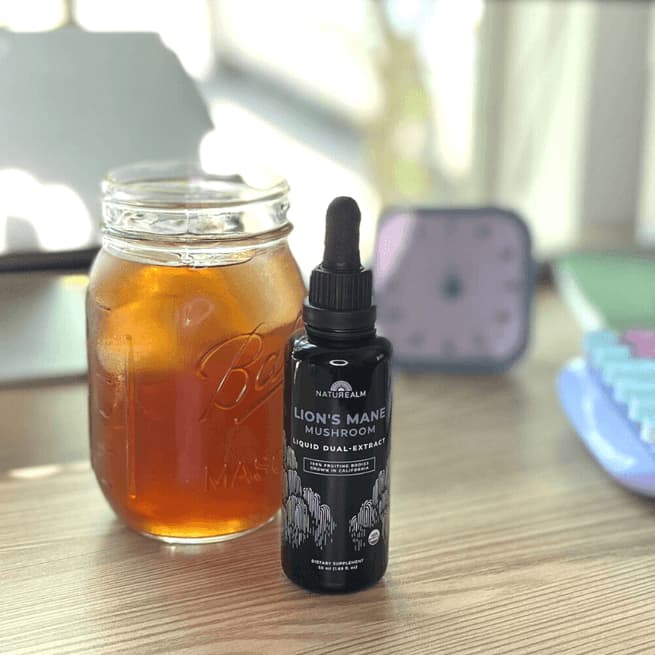

Mushroom tinctures are one of the most portable ways to maintain your mushroom regimen. It’s easy to take a few drops under your tongue or add directly to your drinks on the go. Each mushroom offers unique beneficial compounds, and wide varieties today combine mushrooms for a full spectrum effect.
Whether you’re a longtime adaptogenic supplement fan or new to mushroom supplements, here’s a quick overview of mushroom tinctures to know if they’re right for you.
What is a mushroom tincture?

A medicinal mushroom tincture is a concentrated liquid extract that contains the active ingredients in mushrooms. Humans can’t process chitin, where the nutrient compounds in mushrooms are. Using an extraction method, we produce a concentrated liquid mushroom tincture our bodies absorb.
In most extraction methods, fresh or dried mushrooms soak in an alcohol like ethanol or water. After decoction, the fresh or dried mushrooms are removed, and the liquid extract is ready to be blended or bottled.
Dual extraction vs. single extraction
The most potent mushroom extracts are double extracted: alcohol extraction and hot water extraction. Double extraction methods ensure the product has as many of the mushrooms’ active compounds, like beta-glucans and polysaccharides, as possible.
The alcohol extraction pulls out the soluble compounds, like triterpenes. Solvents like vinegar or glycerin can be used in place of alcohol. The bioactive medicinal compounds in the mushrooms’ cell walls are preserved during alcohol extraction. It also gives it stability for a long shelf-life. The water-soluble compounds in the fungi material activate through hot water extraction.
While single extraction processes produce pure and potent tinctures, double extraction methods can capture the multitude of active compounds in the mushroom material.
Fruiting bodies vs. mycelium
The fruiting body of a mushroom is what you see above ground: the cap, stem, and related parts. It’s the reproductive structure of the mushroom and produces spores. We’re most familiar with the fruiting body because we also cook with it.
The mycelium is the roots that connect underground and produce the fruiting body. While mycelium has medicinal compounds, there are significantly more in the fruiting body.
It’s becoming more common for mushroom supplement companies to use mycelium-on-grain or myceliated grain, where mycelium is grown on a grain substrate. In this process, you’re usually paying for more grain than mushrooms, which means you receive fewer benefits from the mushrooms. In 2016, Paul Stamets filed a patent stating that myceliated grain is about 60-70% grain. That’s not much mushroom at all.
What are the benefits of tinctures?

Mushroom tinctures are quickly absorbed into the body and are easy to mix in most on-the-go scenarios with simple droppers. Most bottles are carry-on friendly for air travel when you want and need that immune system boost.
Tinctures are effective if you’re looking for a way to stay consistent with your mushroom supplement use.
Common mushrooms in tinctures
- Chaga mushrooms are rich in antioxidants for immunity.
- Cordyceps mushrooms boost energy.
- King Trumpet mushrooms support blood glucose levels.
- Lion’s Mane mushrooms are excellent for memory.
- Maitake mushrooms can reduce blood pressure.
- Reishi mushrooms alleviate stress.
- Shiitake mushrooms are a great source of B vitamins.
- Turkey Tail mushrooms support gut health.
Mushroom tinctures and herbal medicine
Mushroom tinctures are far from new. For centuries, mushrooms have played an integral part in Eastern medicine, especially Traditional Chinese Medicine. In 2022, the World Health Organization reported that “88% of all countries are estimated to use traditional medicine, such as herbal medicines, acupuncture, yoga, indigenous therapies, and others.”
Medicinal mushrooms are mentioned in ancient Chinese texts, Egyptian hieroglyphics, Viking writings, and Greek writings. This is a handful of history’s welcome use of the mushroom for immortality. In North American and Mesoamerican cultures, mushrooms were used as natural medicine in texts that date back to the 16th century, and oral stories of use goes back much further. It wasn’t until penicillin became the first mass-produced antibiotic in the 1940s that Western medicine began to notice fungi at all.
Mushroom tinctures I recommend
As functional mushroom use grows in the West, so do the ways to consume them. Medicinal mushroom tinctures have become one of the most popular ways to consume them, right behind mushroom powders. These recommendations are from my tincture supplement routine, which (I think) I’ve perfected over the last two years.
Best all-in-one extract: Rainbo’s 11:11

Rainbo’s 11:11 Super Multi-Mushroom Synergy is my pick for an all-in-one tincture. After using it every day for a month, I noticed that I woke up more alert and energized and had less afternoon fog. I added it to my morning coffee, and off I went.
It has Reishi (Ganoderma lucidum, Fruiting body), Chaga (Inonotus obliquus, Sclerotia), Lion’s Mane (Hericium erinaceus, Fruiting body), Cordyceps (Cordyceps militaris, Fruiting body), Turkey Tail (Trametes versicolor, Fruiting body), Oyster (Pleurotus ostreatus, Fruiting body), Mesima (Phellinus linteus, Fruiting body), Agarikon (Fomitopsis officinalis, Mycelium), Shiitake (Lentinula edodes, Fruiting body), Royal Sun (Agaricus blazei, Fruiting body), and Maitake (Grifola frondosa, Fruiting body).
Best Lion’s Mane extract: Naturealm Lion’s Mane Tincture

I make afternoon tea with this tincture and hot water; that’s how delicious. The taste is clean, and this product is potent. After about 20 minutes, I’m more focused and am less apt to open another tab and get distracted.
It has only Lion’s Mane (Hericium erinaceus, Fruiting body).
In summary
No matter what, there’s a mushroom tincture out there for you. Whether you want to add to your current supplement stack or introduce mushrooms into your routine, tinctures and extracts are one of the most low-maintenance ways.
Editor’s note: Consult a healthcare professional before adding supplements to your diet. Alcohol-based tinctures may not be suitable for those with alcohol abuse issues or severe liver disease.


